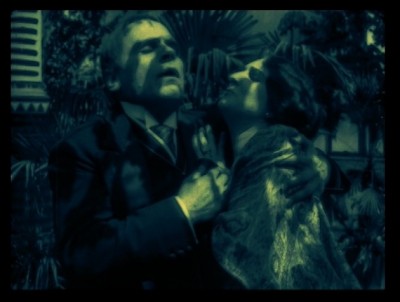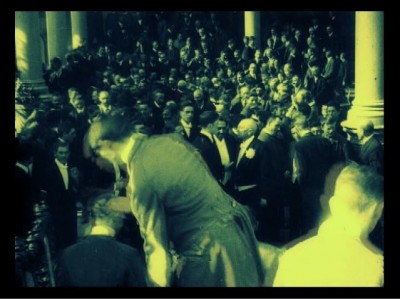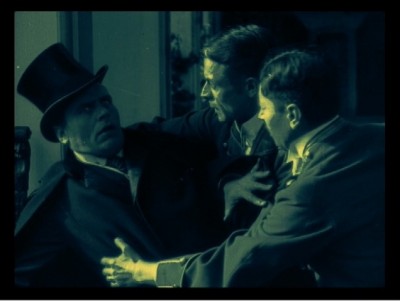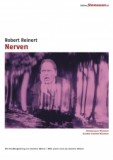| Reviews & Columns |
|
Reviews DVD TV on DVD Blu-ray 4K UHD International DVDs In Theaters Reviews by Studio Video Games Features Collector Series DVDs Easter Egg Database Interviews DVD Talk Radio Feature Articles Columns Anime Talk DVD Savant Horror DVDs The M.O.D. Squad Art House HD Talk Silent DVD
|
DVD Talk Forum |
|
|
| Resources |
|
DVD Price Search Customer Service #'s RCE Info Links |
|
Columns
|
|
|
Nerven
Nerven was a modest critical success but a major box-office failure when it opened in Munich in December, 1919. The film was censored the following year, and a further truncated version was distributed internationally. Though a third of the footage of the original has never been recovered, this DVD release from the prestigious Edition Filmmuseum includes a 2007 restoration incorporating a truncated copy from a Moscow archive together with fragments from the United States Library of Congress and the Munich Filmmuseum.
Nerven is a saga about the families of two politically ambitious rivals: the populist, street preacher Johannes (Paul Bender) and the proto-fascist industrialist Roloff (Eduard von Winterstein). The cast of principal characters includes Johannes' blind sister (Lili Dominici), Roloff's wife (Lya Borré), his radical sister (Erna Morena) and her aristocratic fiancée (Rio Ellbon). Incidental characters of note include a faithful German Shepherd, a lovelorn gardener, a mother with a dark family secret, a psychiatrist with a dueling scar, and street mobs by the throng. Alas, lust, politics, or guilt, directly or indirectly, make nearly everyone miserable and crazed. Before the film is through one miscarriage of justice, one act of arson, two suicides, four murders, and various other desperate and deranged acts thin out the ensemble leaving only two characters to escape the earthly hell of civilization by renouncing everything and beginning afresh in the Bavarian Black Forest like Adam and Eve.
The pessimism of Robert Reinert who wrote, produced, and directed Nerven is all pervasive. Reflecting the doom and gloom of Oswald Spengler's bestselling book of political theory and prognostication, Der Untergang des Abendlandes (The Decline of the West, 1918), Reinert clearly believes that Europe is fatally decayed. For Reinert who can find nothing in modern society that can be saved, the only answer is sweeping away everything and beginning anew.
As agitprop for renouncing civilization and returning to the land Nerven is fascinating, but as silent melodrama it's stale. The writing, direction, and acting is highly stylized with ludicrously exaggerated behavior and cumbersome exposition, as evidenced by the images below.
 |  |
Presentation
Nerven has been released by Edition Filmmuseum, a label founded by six German-language national archives and the Goethe-Institut, on a single dual-layered DVD which is PAL-encoded but not region restricted.
Video:
This release of Nerven is constructed from the best available surviving elements. All signs of dirt have been removed, the footage has been newly tinted in keeping with the practices of the time, and new German-language intertitles have been added with optional English subtitles. However, image quality remains marginal with significant print damage, interlacing, low-contrast and detail, and digital combing.
 |  |
Audio:
This release of the silent film Nerven features a piano score written and performed by Joachim Bärenz. The score is provided in 2.0 DD and is free of dropouts or distortions.
Extras:
Extras include a sixteen-page booklet with German-language essays by Hans Wollenberg and Stefan Drössler, and English-language essays by Jan-Christopher Horak and David Bordwell, nineteen minutes of side-by-side comparisons of different film fragments, fourteen minutes of vintage documentary footage of the street battles in Munich shot in 1919, and a gallery of twenty posters, stills and lobby cards.
Final Thoughts:
As a historical document reflecting the sense of pessimism that many anti-democratic conservatives felt at the end of the German Empire, Nerven is first rate. As melodrama through it was already dated in 1919, and it's gotten no fresher with time.
|
| Popular Reviews |
| Sponsored Links |
|
|
| Sponsored Links |
|
|
| Release List | Reviews | Shop | Newsletter | Forum | DVD Giveaways | Blu-Ray | Advertise |
|
Copyright 2024 DVDTalk.com All Rights Reserved. Legal Info, Privacy Policy, Terms of Use,
Manage Preferences,
Your Privacy Choices | |||||||












